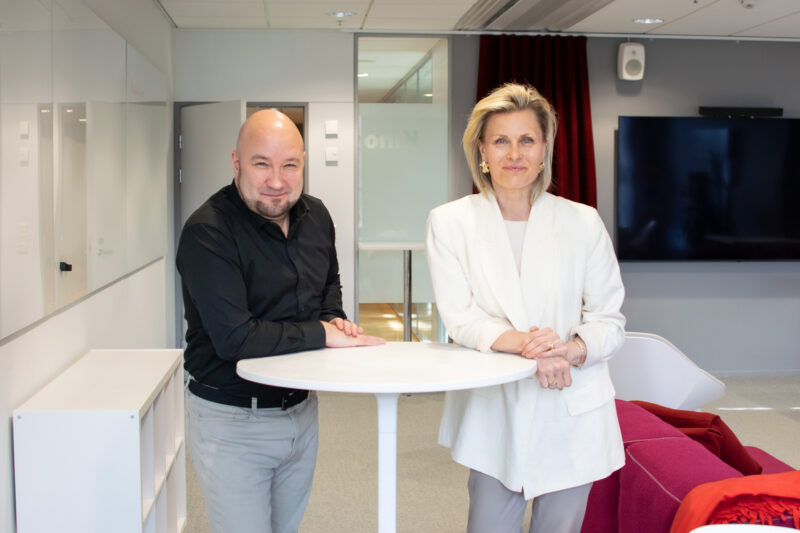From AI hype to reality: how AI agents are changing the world of work
Until now, AI has been a kind of “one-stop shop” for experts in companies. However, measurable business benefits are most effectively achieved when AI is used as a specialised agent for a specific task, argue Sofigate’s Juha Kujala and Juho Nevalainen.
A few weeks ago, the OP Group published a survey showing that almost half of Finnish companies are planning to replace tasks with AI. The most typical tasks to be replaced by AI are related to reporting, data processing, customer service and communications.
The world is even further ahead. Swedish company Klarna has announced plans to replace more than half of its employees with AI in the near future.
It is no longer news that the AI hype has taken over businesses. The potential of generative AI is being actively explored everywhere, and large companies in particular are investing in developing their own AI language models. Companies are particularly keen to use AI to increase productivity by helping workers to perform routine tasks.
At the same time, however, there is a growing sense that many of the current plans are doomed to fail. Research and consultancy firm Gartner has predicted that more than half of the companies that have developed their own language models will be forced to abandon the results of their work in the next few years. This is due in particular to the high cost of developing the models, technical problems and security risks.
However, this does not mean that AI is being abandoned, but rather that we are moving from the hype phase to a more realistic way of using AI. In practice, this is reflected in the increasing use of AI agents.
From assistant to independent operator
The use of language models in companies has largely progressed through experimentation. A generative AI service has been deployed and given various tasks in the hope that the language model will learn something useful from the company’s data.
Major technology companies are now predicting that AI will be used more systematically in the future as part of business platforms with different AI capabilities. In this case, the company will no longer have a single AI assistant who will be assigned various assisting tasks. It will be replaced by a large number of small AI agents, each of which will be trained with data to perform a well-defined task, such as processing customer feedback.
Whereas previously the language model automated only part of the feedback processing and could offer the human responsible for the feedback different options, the agent will autonomously perform the entire task from start to finish – for example, sending a refund to a customer who has made a complaint. Instead of a useful assistant who needs constant guidance, AI becomes an active agent. At the same time, hopes for AI to increase work efficiency will be translated into measurable business benefits.
The advantage of agents is that they can be embedded in the processes and workflows of the enterprise by performing predefined tasks. Because agents operate as part of business platforms, they can also be provided with a wide range of data – from customer management data to ERP or financial management data – which helps them to operate more autonomously. Soon, agents will also be able to use unstructured data, such as PowerPoint presentations and PDF documents.
Strategic competence determines benefits
Tools that understand natural language already exist for building AI agents, and do not require specific technical expertise to use them. The benefits of AI are not driven by technical skills, but by strategic skills. The key is the ability to define in detail the tasks and processes to be assigned to the agents in a way that delivers real efficiency gains and competitive advantage to the organisation.
AI agents are an integral part of business platforms such as Salesforce and ServiceNow.
The importance of data quality will also not change. While agents can handle increasingly diverse data sets, competitive advantage requires that the data is relevant to the business and does not contain gaps.
The key is to understand that while AI agents can automate many of the tasks previously performed by humans, they will not replace humans in the future. The benefits of AI will continue to depend on the skills and decisions of the people who lead and train it.
K Interested in using AI in practice? Book an AI Living Lab for your organisation – click here.
Authors
Juha Kujala is the CTO of Sofigate’s Platforms business. His professional passion is to drive organisations towards better services by leveraging the potential of new technologies. Juha has strong experience in ServiceNow platform and service development management.
Juho Nevalainen is the CTO of Sofigate’s BT Integrator business, which provides end-to-end digital services, especially for growth companies. The integrated services include engineering services, management services, basic IT services and vendor network management services. Juho has long experience in IT management and business development consulting, concept development and commercialisation, and the use of artificial intelligence in business planning.


